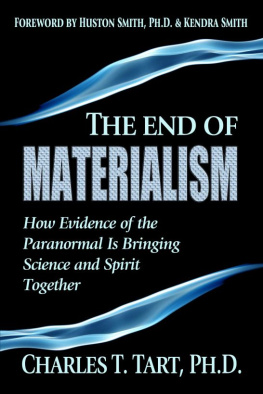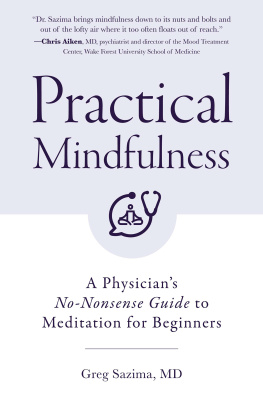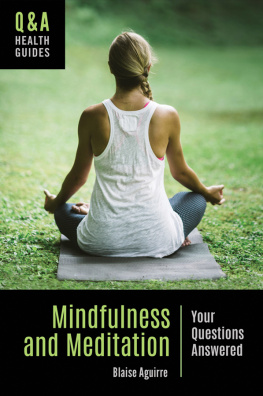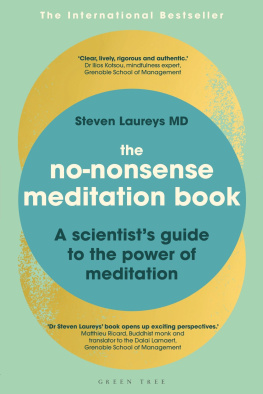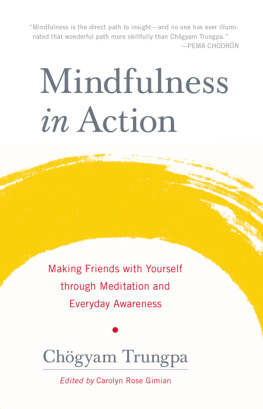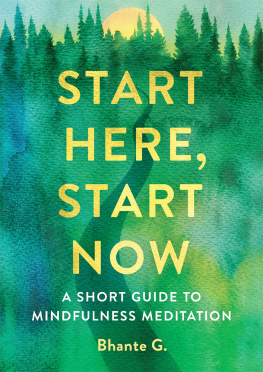Charles T. Tart - Mind Science
Here you can read online Charles T. Tart - Mind Science full text of the book (entire story) in english for free. Download pdf and epub, get meaning, cover and reviews about this ebook. publisher: D. Patrick Miller, genre: Religion. Description of the work, (preface) as well as reviews are available. Best literature library LitArk.com created for fans of good reading and offers a wide selection of genres:
Romance novel
Science fiction
Adventure
Detective
Science
History
Home and family
Prose
Art
Politics
Computer
Non-fiction
Religion
Business
Children
Humor
Choose a favorite category and find really read worthwhile books. Enjoy immersion in the world of imagination, feel the emotions of the characters or learn something new for yourself, make an fascinating discovery.
- Book:Mind Science
- Author:
- Publisher:D. Patrick Miller
- Genre:
- Rating:3 / 5
- Favourites:Add to favourites
- Your mark:
- 60
- 1
- 2
- 3
- 4
- 5
Mind Science: summary, description and annotation
We offer to read an annotation, description, summary or preface (depends on what the author of the book "Mind Science" wrote himself). If you haven't found the necessary information about the book — write in the comments, we will try to find it.
Mind Science — read online for free the complete book (whole text) full work
Below is the text of the book, divided by pages. System saving the place of the last page read, allows you to conveniently read the book "Mind Science" online for free, without having to search again every time where you left off. Put a bookmark, and you can go to the page where you finished reading at any time.
Font size:
Interval:
Bookmark:
MIND SCIENCE
by Charles T. Tart, Ph.D.
Published by Fearless Books at Smashwords
2012 by Charles T. Tart,PhD.
SmashwordsEdition
All RightsReserved
Smashwords Edition, LicenseNotice
This ebook is licensed for your personalenjoyment only. This ebook may not be re-sold or given away toother people. If you would like to share this book with anotherperson, please purchase an additional copy for each recipient. Ifyoure reading this book and did not purchase it, or it was notpurchased for your use only, then please return to Smashwords andpurchase your own copy. Thank for respecting the hard work of thisauthor.
This book would not havebeen possible without assistance from many people. Special thanksgoes to my wife Judy for her support in somany ways and her detailed editorial help, as well as being a vitalteacher to me.
Many people have acted asteachers and exemplars to me and so madethis book, and what understanding I have, possible. As I do notknow how to exactly weigh each teacher's contribution to this book,I will thank the more prominent ones here (under the sociallyacceptable convention of alphabetical order): James Baraz; Lama Anagarika Govinda;Arthur Hastings; Ernest Hilgard; HenryKorman; Jack Kornfield; Harold McCurdy;Claudio Naranjo; Jacob Needleman; Sogyal Rinpoche;Kathleen Riordan Speeth; Tarthang Tulku; Frances Vaughan; Roger Walsh; and Shinzen Young. I want to also thank my various Aikidoteachers, who patiently and repeatedly forced me to learn the vitalimportance of body knowledge and body intelligence, usually bythrowing me, lovingly but forcefully, across the dojo, until I gotsome understanding. Robert Frager inspiredmy wife and me to begin Aikido, and Alan Grow, Bruce Klickstein , SteveSasaki and Pietro Maida trained us well.
This book is dedicated to all thosewho suspect an important part of the answers to the questions andproblems of life will come from becoming better acquainted with ourinternal, psychological functioning and by waking up from thedreamlike fantasies that blind us from having and practicinginsight and compassion.
Introduction:
Why is a Scientist Writing a Book on Meditation andMindfulness?
As we enter thetwenty-first century, too many people suffer. Much of this suffering is from factors way beyond myability to affect, but a good deal of it is needless suffering thatI can do a little about, suffering that stems from a widespreadconflict between science and religion .
On the one hand, we have ascience that apparently long ago showed that all religion andspirituality is superstitious and pathological nonsense left overfrom more primitive times, best thrown out as quickly andthoroughly as possible. On the other hand, we have both traditionalreligions and "New Age" spiritual movements appealing to somethingdeep within us, but operating in a way often dissociated fromscientific knowledge or with thin and dubious rationalizations onthe order of "quantum physics is verymysterious, maybe religion is Okay after all?" In between are wereal human beings who need (psychologically as well as spiritually) a view ofreality and our place in it that is much bigger and more meaningful than the apparently scientific,life-as-meaningless-biological-accident view associated withcontemporary science, but who can't simple turn their backs on thegreat knowledge we've gained through science or deny itspower.
Science gives us power, power to improve theworld or destroy it, but gives us no moral guidance on using thatpower. Spirituality can give uscompassion , morality and connectedness , but nineteenth andtwentieth century science seems to have undermined spirituality,leaving us with increasing power but no clear morality. We cannotsurvive in this new millennium if this trend goes on.
I have struggled betweenthese poles of conflict for many years and now reached a stagewhere I am comfortable with, indeed proud of, calling myself both a rigorous,no-nonsense scientist on the one hand and a spiritualseeker on the other.
The kind of resolution I'vereached resulted in 1998 with my teaching a workshop on how topractice meditation and mindfulness, as foundational keys to, amongother things, direct psychological and, hopefully, spiritual experience about themind instead of beliefs and dogmas about our nature. This workshopwas for a group composed primarily of scholars and scientists atthe University of Arizona's third "Toward a Science ofConsciousness" meeting in Tucson. I believethe way I was able to successfully teach basic meditation andmindfulness practices for this audience is useful for all of uswho've grown up in a culture that is dominated by science (anddistorted ideas about what science is), whether we personally makeour living as "scientists" or not. What we think of as scientifictruths about the world have major effects on who and what we thinkwe are and what is possible and impossible for us. This book isbased on that workshop, deliberately keeping the informal style ofa workshop but with the considerable improvement in phrasing thatcomes about with the wisdom of hindsight. My aim is to help othersresolve the science versus spirituality conflict in at least somesmall way, so this new century can bring these two major forcestogether, not force them further apart.
This book is focused on giving themodern, Western reader, who is at least partially oriented towardscientific ways of thinking about things that is, pretty much allof us enough of a taste of basic methods of formal meditationpractice and enhanced mindfulness in daily life to see what theyare like and their advantages. There are suggestions for findingmore advanced instruction and/or getting into the researchliterature, but this is not a scholarly book about meditation, nora comprehensive review of the scientific research that has beendone on it.
Nor is this a book aboutreligion but Western religion has affected all of us strongly,whether we consciously accept it or reject it, so let's talk moreabout religion .
Like many of us, I was raised withstrong Western religious beliefs Missouri Synod Lutheran in mycase and, as a child, I basically believed what I was taught. Theuniverse was created by God and existed for His Reasons. Our job (atough, if not impossible one!) was to avoid sin and be good orelse! But at least life made a kind of sense and the rules wereclear.
By the time I was a teenager, readinga lot and thinking for myself, problems arose with this simplefaith. I wanted to be "good," but interpretation of exactly whatwas good and bad got quite difficult at times, and the behavior ofmany adults I knew, who professed to be religious, often seemedinconsistent and hypocritical.
I also became more and morefascinated by science , reading voraciously,and the conflict between science and religion became very real for me as happens for so many of us inmodern Western culture. While some scientists of the past saw theirwork as revealing the glories of God ever more deeply, mostscientists today apparently have no use for God or Divine Plans ina scientific world view, and many have claimed and continue toclaim that all ofreligion is primitive, superstitious nonsense that we should leavebehind, indeed that religions have vastly increased craziness andsuffering in the world. As I now could recognize many examples ofpathology in common religious doctrines,practices and ideas, this was a powerful argument.
And yet wasreligion totally nonsense? Or was there some core of valuable truth hidden downamong doctrines, theologies, rituals and customs? I struggled a lotwith these kinds of questions in my teenage years.
Many of my contemporarieswent through similar struggles, and I suspect many of you havealso. As an adult, with the wisdom of hindsight, I was able to seethe most common kinds of apparent resolutions people found. Onecommon pattern was for people to become materialists and thus reject religion entirely, as indeedbeing nothing but total nonsense. This pattern of resolution variedfrom simple agnosticism at the one extremeto a strong denial of God's existence in those who became passionate, atheistic materialists. In some of my friends thiskind of passion was a reactive anger to disappointment inpracticing their childhood religion, a kind of "If God won't answermy prayers (the way I want them answered) I won't believe in him!" response, laterrationalized as a logical decision to reject religion for lack ofevidence.
Next pageFont size:
Interval:
Bookmark:
Similar books «Mind Science»
Look at similar books to Mind Science. We have selected literature similar in name and meaning in the hope of providing readers with more options to find new, interesting, not yet read works.
Discussion, reviews of the book Mind Science and just readers' own opinions. Leave your comments, write what you think about the work, its meaning or the main characters. Specify what exactly you liked and what you didn't like, and why you think so.


